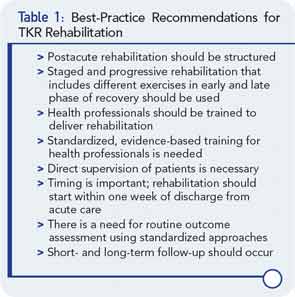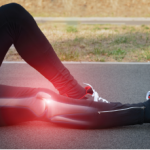Westby then described a second effort to develop a more standardized approach to post-acute care using a formal consensus process to develop best practice recommendations. She and her colleagues used an online Delphi survey that included a panel of Canadian and American physical therapists, orthopedic surgeons, other physicians, other health professionals, and patients who have undergone TKR to develop consensus on key recommendations. Key recommendations for best practice of TKR are shown in Table 1. Among the types of interventions that the panel emphasized as important were exercise programs that included active range of motion, strength training, home exercises, dynamic balance, stair climbing, and rising from/lowering to a chair.
Overall, the consensus panel emphasized that the setting and format of postacute rehabilitation is less important than the type and intensity of intervention and knowledge and skill of the provider. It also emphasized the importance of integrating personal factors of the patient (e.g., functional status, psychological status, general health) and external factors (e.g., skills of the rehabilitation professional, support of spouse or family, access to rehabilitation programs) into the planning and delivery of postacute TKR rehabilitation.
Mary Beth Nierengarten is a freelance medical journalist in St. Paul, Minn.



